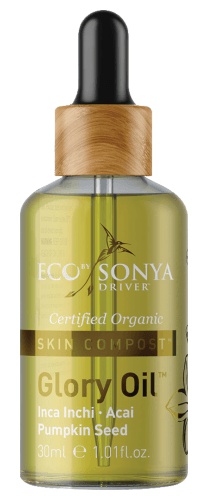
Glory Oil
Highlights
Skim through
| Ingredient name | what-it-does | irr., com. | ID-Rating |
|---|---|---|---|
| Organic Grape Seed Oil* | antioxidant, emollient | goodie | |
| Organic Coconut Fruit Oil* | |||
| Organic Jojoba Seed Oil* | emollient | 0, 0-2 | goodie |
| Organic Acai Fruit Oil* | |||
| Organic Chia Seed Oil* | antioxidant, emollient, moisturizer/humectant | goodie | |
| Organic Pumpkin Seed Oil* | emollient | ||
| Organic Sacha Inchi Seed Oil* | antioxidant, emollient, moisturizer/humectant | goodie | |
| Natural Vitamin E** | antioxidant | 0-3, 0-3 | goodie |
Eco TAN Glory OilIngredients explained
A goodie plant oil coming from the polyphenol-rich seeds of the grape. It's a light emollient oil that makes your skin feel smooth and nice and also contains a bunch of good-for-the-skin stuff. It's a great source of antioxidant polyphenols, barrier repair fatty acid linoleic acid (about 55-77%, while oleic acid is about 12-27%) and antioxidant, skin-protectant vitamin E.
This ingredient name is not according to the INCI-standard. :( What, why?!
Jojoba is a drought resistant evergreen shrub native to South-western North America. It's known and grown for jojoba oil, the golden yellow liquid coming from the seeds (about 50% of the weight of the seeds will be oil).
At first glance, it seems like your average emollient plant oil: it looks like an oil and it's nourishing and moisturizing to the skin but if we dig a bit deeper, it turns out that jojoba oil is really special and unique: technically - or rather chemically - it's not an oil but a wax ester (and calling it an oil is kind of sloppy).

Chia seeds are in fashion and there is a reason for that. They are not only a superfood for your body but putting the oil all over your face seems to be a good idea too.
Its unique property is that it's the richest known botanical source of skin moisturizing and probably anti-inflammatory alpha-linolenic acid (contains 50-60%). It also contains barrier repairing linoleic acid (17-26%) and only a small amount of very nourishing but potentially acne causing oleic acid (7%).

An emollient plant oil coming from the Sacha Inchi plant from the Colombian Amazon.
Similar to other plant oils, it's loaded with nourishing and moisturizing fatty acids: it's especially rich in α-Linolenic acid (42-49%) and linoleic acid (32-38%) and contains less oleic acid (9-14%). It also contains a decent amount of antioxidant vitamin E (200 mg/kg).
- Primary fat-soluble antioxidant in our skin
- Significant photoprotection against UVB rays
- Vit C + Vit E work in synergy and provide great photoprotection
- Has emollient properties
- Easy to formulate, stable and relatively inexpensive
You may also want to take a look at...
| what‑it‑does | antioxidant | emollient |
| what‑it‑does | emollient |
| irritancy, com. | 0, 0-2 |
| what‑it‑does | antioxidant | emollient | moisturizer/humectant |
| what‑it‑does | emollient |
| what‑it‑does | antioxidant | emollient | moisturizer/humectant |
| what‑it‑does | antioxidant |
| irritancy, com. | 0-3, 0-3 |





